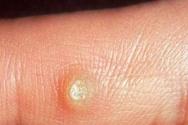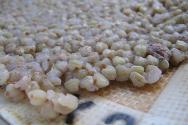How to choose the right lemons. Diseases of citrus fruits membranosis disease affects fruits Lemon with thin peel
Visually, lemons may differ in shape, smoothness of the peel, richness of its shade, as well as the size of the fruit. Lemons almost always taste the same, but due to improper storage, fruits with a rather bitter taste may occur.
When choosing a lemon, you can ignore the color of the peel and size. It is much more important to determine the ripeness and quality of the fruit. This is done visually. It is not necessary to cut a lemon to determine its quality.
In shape, lemons can be round, oval, with elongated stalks or tips, and also have elongated fruits. The reason for this diversity is the varieties of these citrus fruits. Almost all varieties taste the same.
Lemons can be broadly divided into two categories based on the thickness of the peel.:
- with thin skin;
- with thick skin.
It is difficult to say that some lemons can be bought and others cannot. Both of these types are consumed in different ways. For example, thick-skinned lemons are ideal for adding to soups or drinks, while thin-skinned fruits are best purchased when juice is important.
How to choose a lemon
Sometimes lemons can have a bitter taste. This quality is not characteristic of good ripe fruit. There can be two reasons for bitterness: improper storage or treatment with antibiotics to extend shelf life. The natural cause of the bitter taste may be the unripe state of the fruit. In any case, if the lemon is bitter, then you can get rid of this quality with boiling water. The fruit is dipped in boiling water for a few seconds and then consumed in its intended form.
Which lemons are worth buying?:
- the surface of the lemon should have a uniform color without dark spots or dots;
- The lemon peel should be smooth without depressions, wrinkles or wilted areas;
- the aroma of lemon should be felt through the skin and be characteristic of this type of citrus fruit;
- If you lightly squeeze a lemon in your hand, its peel should be elastic (a lemon that is too hard will be unripe);
- a ripe lemon can only be yellow;
- if you apply a napkin to a lemon, then traces of essential oils should remain on its surface (if there are no traces, this does not mean that the fruit is of poor quality, but the release of oil indicates the absence of chemical treatment);
- lemons with thin and smooth skin have higher performance useful properties(such fruits are usually removed during the first harvest of the tree).
- if the lemon peel is not smooth, then when you cut the fruit it will also turn out to be thick (there will be too much peel and not enough pulp);
- if black dots or small spots appear on the surface of the lemon, then the fruit was stored incorrectly and, most likely, was overcooled (the taste of such a lemon will be bitter);
- dark and sluggish spots on the peel indicate the beginning of the rotting process (the taste of the lemon will be spoiled, and the amount of juice will be reduced several times);
- lemons with a too shiny surface have been treated with chemicals or paraffin;
- if the lemon does not smell, then it was grown using a lot of chemicals;
- if, when squeezing a lemon in your hand, its peel is soft and does not spring back, then the fruit is overripe;
- greenish or green spots on the lemon peel are a sign of its unripeness;
- limp lemon peel may be a consequence of improper storage, overripeness or rotting of the fruit from the inside (there may be no brown spots or dots on the surface of the peel);
- There are fewer vitamins in thick-skinned lemons than in thin-skinned fruits (the beneficial properties accumulate in the white layer between the pulp and the peel).
You can buy unripe lemons. This option is acceptable, for example, if you do not plan to eat citrus fruits immediately after purchasing them. At room temperature The fruits ripen quite quickly.
Regular consumption of lemons during the cold season will reduce the risk of contracting respiratory diseases. To choose a quality lemon, you need to know its signs.
Signs of a good lemon
With the variety of lemons on the market, you need to understand which ones are ripe and will benefit you the most. A good lemon has:
- clean peel;
- citrus aroma;
- small size;
- elastic shape.
How to choose a lemon
To choose the right lemon, pay attention to its appearance.
Peel
Traces of dents or damage on the peel indicate improper storage or transportation of the fruit. High shine and bright color of the peel are signs of processing food coloring and wax.
The greenish color of the skin indicates that the lemon is not ripe and has many useful elements.
Black dots and slight peeling of the peel from the pulp are a sign that the fruits have been frozen and the content of nutrients in them has decreased. Frozen lemons also contain bitterness, which you can get rid of by scalding the lemons with boiling water and leaving them in it for a few minutes.
Thick-skinned lemons have an oblong shape and a bumpy surface. The content of vitamins and useful enzymes for their absorption is greater in them than in thin-skinned ones, since their albedo - the white layer between the peel and the pulp - is wider. Thin-skinned lemons have a smooth, finely porous surface and a round shape.

Size
The large size of a lemon indicates that it has little vitamin C. Buy medium-sized fruits from the Abkhaz regions. Such lemons can be stored at 0C for a long time and not lose their beneficial qualities.
Small lemons contain a lot of vitamin C, but less potassium and enzymes.
Essential oils
To determine the quality of a lemon, use a dry paper napkin. Press the napkin onto the lemon. Traces of essential oils will indicate to you the high quality of the fruit, since processed fruits do not contain essential oils.
Bones
Choose seedless lemons, as the seeds contain reagents that cause intense bile secretion and provoke a severe allergic reaction.
Signs of a bad lemon
A lemon of poor quality is indicated by:
- soft peel that does not adhere well to the pulp;
- brown or black spots on the peel;
- dent on the peel after pressing;
- bright yellow color;
- bitterness;
- white crystals in the center of the pulp when cut;
- foreign odor;
- green tint of the peel;
- strong shine.
Lemon is one of the most common citrus fruits. But at the same time, unlike oranges, tangerines and grapefruits, lemon is primarily valued not for its taste, but for its healing properties. As soon as you get sick, they remind you: be sure to drink tea with lemon. This citrus fruit is brought to the hospital for every patient; it is already a classic of the genre, along with oranges. Lemon juice is used in many diets, as well as home and folk recipes beauty. So, lemon - how can it be useful to us, how to choose it and when and to whom it is not recommended to consume lemons.
What's in a lemon?

Organic acids.
Phytoncides.
Flavonoids.
Riboflavin.
Hesperidin.
Sesquiterpenes.
Calcium.
Cellulose.
Carotene.
Bitter substances and oil (in seeds).
Ascorbic acid.
Vitamin A, D, E, B1, B2, B9, PP.
100 grams of fresh lemon contains 40 mg of vitamin C.
Benefits of lemon and lemon juice

Lemon contains a huge amount of ascorbic acid. That's why lemon juice is an excellent tool:
o to strengthen the immune system;
o Lemon juice helps lower blood sugar levels;
o has antipyretic properties;
o tones and fills the body with energy.
Also, lemon zest and juice have a high antiseptic effect. Rinsing the mouth with diluted lemon juice or brewed zest can cure even purulent sore throat.
Lemon juice also has beneficial effects on urolithiasis. As doctors note, sand and small stones can dissolve with prolonged use of lemon juice.
Lemon juice is indispensable for removing toxins, normalizing metabolism and treating obesity.
Lemon also helps with old coughs.
But the true panacea is lemon juice to strengthen and rejuvenate the walls of blood vessels. Citrine, which is part of this juice, combined with ascorbic acid, not only strengthens capillaries, veins and arteries, but also makes them elastic. Therefore, periodic consumption of lemon in food is a prevention of most vascular diseases.
Harm of lemon

Lemon is a strong allergen, like all citrus fruits. Therefore, you should not consume it in very large quantities. Also, an allergic reaction can be triggered by the chemicals that lemons are treated with when growing.
Concentrated lemon juice is harmful to tooth enamel; it destroys it, especially if it enters the oral cavity along with sugar.
Citric acid strongly irritates the gastric mucosa and can provoke an exacerbation of gastritis or peptic ulcers of the stomach and duodenum, so people suffering from these diseases should consume lemon with extreme caution, and best of all, exclude it from the diet. This fruit is also not recommended for people suffering from pancreatitis. Lemon juice often causes heartburn.
For inflammation in the mouth and throat, rinsing with undiluted lemon juice can lead not only to irritation and pain, but even to bleeding and prolonged healing.
Hypertensive patients should also treat this fruit with caution, because it can increase blood pressure.
Lemon should not be given to children under two years of age, because children are often allergic to lemon juice, and it also has a negative effect on the child’s gastric mucosa.
Pregnant and nursing mothers should be careful.
How to choose a lemon

Lemons last a very long time if you choose them correctly. The bright color of the peel does not always indicate the ripeness of the fruit.
If the lemon peel is shiny and the fruit feels hard to the touch, it means it is unripe and will be stored for a long time; such lemons are more sour than ripe ones.
If the lemon is a little soft and the peel is matte, then this is a ripe fruit that will only last a few days.
Sometimes lemons are overcooled during transportation; you can immediately distinguish them by the presence of small brown spots on the peel; such lemons have a bitter aftertaste.
How to check the quality of a lemon

When purchasing, pay attention to the appearance of the fruit. It should be dense, the skin should be shiny, without signs of rotting, damage, compaction or brown spots.
Do you know why lemon can taste bitter? Because or he was “stuffed” with antibiotics for more long storage, either it’s frozen, or it’s not yet ripe.
In the cut, the film should fit tightly to the slices.
Thick-skinned lemons have more vitamins than thin-skinned ones, since the subcutaneous white layer (albedo), which is considered the most tasteless, contains the highest concentration of bioflavonoids, which help the absorption of vitamin C, and vitamin C itself.
How to use it correctly

Lemon water
To obtain maximum benefit from lemon water, it should be prepared and taken as follows:
Wash 1 lemon and grind it, including the peel, in a blender or food processor.
Add one tablespoon to a glass of boiled water and drink.
You should take this drink at least 3-4 times a day, half an hour before meals.
Please note that the water should not be hotter than 50 degrees. Otherwise, half of the beneficial substances (and primarily ascorbic acid) will simply be destroyed.
Tea with lemon
Lemon tea should also be prepared in a completely different way than we are used to. The main difference in preparing this drink is adding lemon juice only to the cooled tea. Otherwise, as in the case of lemon water, most of the beneficial substances will be lost.
The second secret is that it is better to prepare green tea with lemon. It is this combination of beneficial properties that creates a drink that can work wonders. Normalization of blood pressure, prevention of respiratory diseases, rejuvenation of body cells and sustainable weight loss - this is an incomplete list of what drinking green tea with lemon guarantees.
Lemon has beneficial properties, but also harmful properties this fruit has no less. When consuming lemon or its juice, be careful.
A few words about the benefits of lemon
Lemon is a storehouse of all kinds of useful substances necessary for humans. In addition to the notorious vitamin C, for which the fruit is especially valued, it contains vitamins A, almost the entire range of vitamin B (with the exception of B12), vitamin E, which is so necessary to maintain vigor and youth of the body, as well as PP, necessary for redox processes in organism.
Macro- and microelements such as calcium, potassium, sodium, magnesium, as well as iron, zinc, manganese (the list is endless), elevate yellow citrus to the pedestal of usefulness. It is no secret that other fruits and berries contain no less amount of substances necessary for the body, but only lemon has an excellent protective agent - a thick peel - which allows you to preserve all the vitamins inside for a long time after the fruit has been removed from the tree.
 First of all, the sour fruit is eaten. Eating it the same way as an apple, biting off pieces, is unlikely to work, but use the fruit in doses for cooking. various dishes simply necessary. Put a piece in sweet tea, bite a glass of cognac with a candied slice, use it in cooking fish dishes or confectionery, and also make real refreshing lemonade - this is not a complete list of using lemon as an addition to your favorite foods.
First of all, the sour fruit is eaten. Eating it the same way as an apple, biting off pieces, is unlikely to work, but use the fruit in doses for cooking. various dishes simply necessary. Put a piece in sweet tea, bite a glass of cognac with a candied slice, use it in cooking fish dishes or confectionery, and also make real refreshing lemonade - this is not a complete list of using lemon as an addition to your favorite foods.
But the scope of application of the fruits of the lemon tree is much wider than its use in cooking.
- Lemon juice can fight stains on clothes and excess pigmentation on the skin. Juice diluted in water can add shine to hair and protect nails from brittleness. In small doses, it helps regulate digestion and makes it possible to get rid of extra pounds.
- Lemon zest is a real panacea for people suffering from diseases of the respiratory system; citrus peel is especially good for sore throats. In addition, the zest is a mild aphrodisiac, so essential oils, contained in lemon peel, are actively used in perfumery.
- Lemon in general is excellent at combating cold symptoms. In combination with a hot drink, it effectively reduces fever due to its diaphoretic properties, and also relieves drowsiness and lethargy.
It's no secret that not all sour citrus fruits lying in neat rows in the store are useful and have outstanding properties. healing properties. Considering that citrus is practically not grown in our country and most of the fruit is imported from abroad, you need to buy lemon only after making sure that it is fresh, intact and free from mechanical damage.
 The only indicator you can focus on when buying citrus is its peel. It is its color, texture and overall appearance that can suggest what is hidden inside the fruit.
The only indicator you can focus on when buying citrus is its peel. It is its color, texture and overall appearance that can suggest what is hidden inside the fruit.
- Color. The bright specific shade characteristic of the fruit zest does not always indicate that the lemon is ripe. The degree of ripeness is best determined by its shine: a greenish fruit has a somewhat dull surface, while a ripe product has a polished shine. If you are going to store fruit for a long time, it is better to purchase an unripe specimen; it will not spoil longer, especially if you follow the right conditions storage
- Size. The quality of a lemon is completely independent of the size of the fruit. The size and shape of the fruit are related only to the type of tree from which it was picked. Therefore, the size of a product is not at all an indicator of its advantage.
- Density. In order to determine the ripeness of the fruit, you need to press firmly on the fruit with your finger and check the springy properties of the peel. If the skin is difficult to deform, you have an unripe specimen; if the dent quickly dissipates, the fruit is ripe; if the pit does not straighten out, and the lemon feels limp and soft to the touch, you have an overripe fruit that will not last in the refrigerator for two days, and certainly not will have no benefit if consumed.
- Peel thickness. Determining the thickness of a lemon peel by eye is not easy, but it is possible. Thick-skinned fruits have a bumpy and rougher surface, while smooth and delicate lemons are more likely to be thin-skinned. A thick peel more reliably retains all the beneficial properties, sealing them inside, however, a thin membrane is evidence that the lemon tree has recently begun to bear fruit and the amount of vitamins in it is much higher than in “older” lemons. Thus, the choice should be made by the buyer himself, guided by his own preferences.
- Defects. If black spots or dark spots are clearly visible on the skin of the fruit, this indicates that the citrus was frozen during transportation or storage. Therefore, if you are going to choose a non-bitter lemon, you must avoid fruits with such defects.
Storage rules
 Even a correctly chosen lemon will not have time to please you if you do not follow the basic rules for storing it:
Even a correctly chosen lemon will not have time to please you if you do not follow the basic rules for storing it:
- Do not put lemon in the freezer.
- Store on the bottom shelf or refrigerator door.
- Do not leave cut lemons in the refrigerator for more than a day.
- If you come across a bitter lemon, you need to pour boiling water over the fruit.
If you prefer to grow tasty and healthy lemons at home and do not depend on the assortment offered in a store or supermarket, then you need to choose the right bud for lemon grafting. This is how you can grow a whole tree from one small seed and enjoy delicious fruits all year round.
Was this article useful to you?
One of those products that can always be found in the refrigerator of almost any resident of Russia. Lemons are added to tea and coffee, made into juice and jam, or simply eaten raw. With all this, many do not know how to choose the right lemon in the store so that it is the most tasty and healthy. In addition, lemons are much more expensive than some vegetables, so it’s always a shame to spend money and discover at home that you bought a low-quality product. In this article we will introduce you to the basic rules for choosing quality lemons.
First of all, as with all other fruits and vegetables, you need to decide why you are buying lemon? Do you plan to store it or use it immediately? If you are aiming for long-term storage, then it is best to buy unripe lemons; they can be stored for several months, the main thing is to put the citrus in a cold place. The ideal place to store lemons is the bottom compartment of the refrigerator., but not a freezer! Cold temperatures will only harm the lemon, causing it to lose many of its beneficial properties. If you don’t want to store lemons all winter, then you should immediately buy fully ripe fruits.
What is the right lemon color?
Now about how to distinguish a ripe lemon from an unripe one? It's very simple, a ripe lemon's peel sparkles as if someone had just polished it! Wherein The intensity of the color has absolutely no meaning.
Another important property that is worth paying attention to is hardness. When squeezed in your hand, a ripe lemon springs back a little, but remains firm. If the lemon is soft, it is overripe. It doesn’t matter whether the lemon inside turns out to be rotten or not, the taste and, most importantly, medicinal properties such fruit will not be of the best quality. Overripe lemon can also cause stomach problems, nausea and vomiting. Be careful and if you do buy a stale lemon, it is better to throw it away.
The next trick when choosing lemons is to choose fruits with the “right” skin. It is believed that lemons from the first harvest have smooth skin, that is, those collected from a tree bearing fruit for the first time. The concentration of nutrients in such lemons is much higher than in fruits of subsequent harvests. You should also pay attention to the fact that an overly lumpy skin indicates that the skin of the fruit is very thick, and, therefore, the weight of such lemons will be much greater, although they will have the same amount of pulp as lemons with normal skin. This is important if you buy citrus not by piece, but by weight.
Sometimes brown marks appear on the lemon. Usually, this indicates that the lemon was overcooled, which means it has lost most of its beneficial properties and vitamins. In addition, such lemon often begins to taste bitter. There can be several reasons for bitterness: firstly, lemons treated with chemicals become bitter (unscrupulous manufacturers often do this so that the fruit is better preserved during transportation); secondly, sometimes unripe lemons taste bitter, but in this case, you just need to leave them to ripen for a while, the bitterness will disappear. It is best, if possible, to try the lemon before purchasing, then you will be able to avoid many unpleasant consequences, because you cannot fool the taste.

If, however, you have already bought a lemon that is bitter, but do not want to throw it away, there is one folk way – You need to pour boiling water over the lemon, this will reduce the bitterness.. It is also worth remembering that the seeds and peel of lemon give its taste a bitter taste, therefore, when cooking, you should remove them, otherwise you risk ruining the dish.
These are all the tricks you need to know when buying a lemon. Enjoy the shopping and remember, only fresh and ripe fruits, and to choose them among all the others, you just need to be a little more careful.







